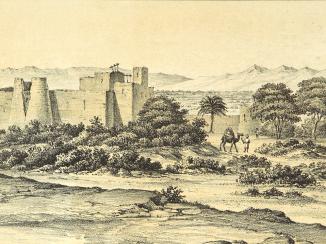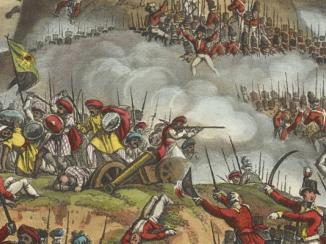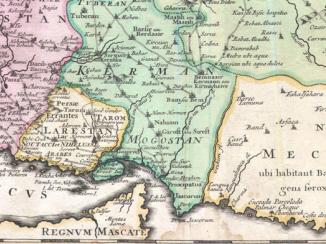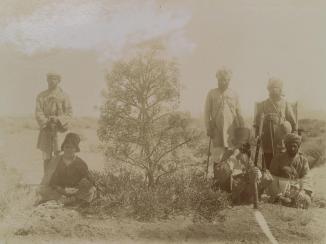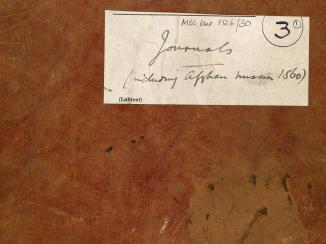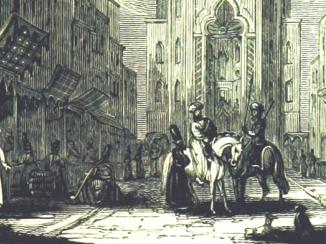Persian Affairs
IOR/L/PS/5/451, ff 1A-128
256 items in this record
Search within this record
The record is made up of 1 item (129 folios). It was created in 30 Sep 1847. It was written in English. The original is part of the British Library: India Office The department of the British Government to which the Government of India reported between 1858 and 1947. The successor to the Court of Directors. Records and Private Papers Documents collected in a private capacity. .
About this record
- Content
This item comprises copies of enclosures to a despatch from the Government of Bombay From c. 1668-1858, the East India Company’s administration in the city of Bombay [Mumbai] and western India. From 1858-1947, a subdivision of the British Raj. It was responsible for British relations with the Gulf and Red Sea regions. Secret Department to the Secret Committee Pre-1784, the Committee responsible for protecting East India Company shipping. Post-1784, its main role was to transmit communications between the Board of Control and the Company's Indian governments on matters requiring secrecy. , Number 81 of 1847, dated 30 September 1847. The enclosures are dated 14 June-14 August 1847.
The primary documents are despatches of Lieutenant-Colonel Justin Sheil, HM Envoy and Minister Plenipotentiary at the Court of Persia [Iran], to the Chief Secretary to the Government, Bombay, forwarding for the information of the President and Governor in Council, Bombay, and the Governor-General of India, copies of his despatches to Viscount Palmerston, HM Principal Secretary of State for Foreign Affairs. The enclosures in Sheil’s despatches notably include copies of his correspondence with the Persian Prime Minister, Hajee Meerza Aghassee [Ḥājjī Mīrzā A title of honour originally applied to princes, later to military leaders, and later still to secretaries, chieftains, and other ‘gentlemen’. (ʿAbbās Īravānī) Āqāsī], and copies of correspondence of or with: Major Henry Creswicke Rawlinson, Political Agent A mid-ranking political representative (equivalent to a Consul) from the diplomatic corps of the Government of India or one of its subordinate provincial governments, in charge of a Political Agency. , Turkish Arabia A term used by the British officials to describe the territory roughly corresponding to, but not coextensive with, modern-day Iraq under the control of the Ottoman Empire. [Ottoman Iraq]; Major Samuel Hennell, Political Resident A senior ranking political representative (equivalent to a Consul General) from the diplomatic corps of the Government of India or one of its subordinate provincial governments, in charge of a Political Residency. in the Persian Gulf The historical term used to describe the body of water between the Arabian Peninsula and Iran. ; Keith Edward Abbott, HM Consul in Tehran; and Lord Cowley, HM Minister at Constantinople [Istanbul].
The despatches cover numerous matters, including the following:
1) The involvement of Sheil, Richard White Stevens, the British Consul in Tabreez [Tabriz], the Governor of Bagdad [Muḥammad Najīb Pāshā, Governor of Baghdad], and Rawlinson, in the reconciliation of Rassool Pasha An Ottoman title used after the names of certain provincial governors, high-ranking officials and military commanders. [Rasūl Pāshā], the ex-Meer of Rewandooz [Mīr of Rawandiz, Iraqi Kurdistan], with the Governor of Bagdad, subsequent to the former’s unsuccessful attempt at rebellion (ff 5-8).
2) The Persian Government’s political tensions with the Turkish Government [Ottoman Porte] notably regarding:
- Military preparations of the Porte for the reduction of the ‘insurgent’ Bedr Khan Bey [Badr Khān Beg], Chief of Bohtan [also known as Buhtan and Bokhti], and the approach of a detachment of the Turkish Army to Van (bordering north western Persia)
- The slow progress of peace negotiations at Erzeroom [Erzurum] and Persian suspicions concerning perceived favouritism by the mediating powers (Britain and Russia) towards Turkey
- The potentially disastrous effect on Persian inhabitants (notably in religious places such as Kerbella [Karbala]) of new Ottoman regulations prohibiting the subject of any foreign power acquiring property of any kind in the Turkish dominions and the intention to apply the regulations retrospectively
- The allegation that Persian ‘Mahomedan’ [Muslim] subjects are treated less favourably than Russian ‘Mahomedan’ by Turkey with regard to the passport taxes enforced by the Governor of Bagdad
- The refusal of the Turkish Government to remove their Guard Ship near Mohemmera [Khorramshahr, formerly Mohammera, also spelled Muhammera in this item] to a position further up the Shat-ul-Arab [Shatt al-Arab River].
3) Sheil’s annoyance with Hennell for asking Rawlinson to obtain from the Ottoman Porte orders for the authorities at Bussorah [Basra] to seize all Persian vessels taking refuge in the Shat-ul-Arab which have committed acts of ‘piracy’ or ‘outrage’ in the Persian Gulf The historical term used to describe the body of water between the Arabian Peninsula and Iran. , since the privilege was given discreetly by the Governor of Fars without the knowledge of the Persian central government who may withdraw it should it become widely known (ff 18-20).
4) Sheil's concerns regarding the apparent extension of Russian influence in Asterabad [Gorgan] and his suggestion that Mr Abbott, HM Consul in Tehran, visit that place since no one of the British Mission has been there since 1845 (f 25).
5) Sheil’s efforts to persuade the Persian Government to adhere to its alleged promise to replicate the action of the Ottoman Porte and issue a firman A Persian word meaning a royal order or decree issued by a sovereign, used notably in the Ottoman Empire (sometimes written ‘phirmaund’). [edict] for ‘the abolition of the traffic in slaves in the Persian Ports of the Persian Gulf’ (f 37), including: the claim of the Shah [Muḥammad Shāh Qājār, Shāh of Persia] that his refusal is for religious reasons; Hajee Meerza Aghassee’s claim that the Shah’s true motive is irritation at the delay in concluding treaty negotiations at Erzeroom (which he apparently blames on mediators Britain and Russia); Sheil’s conviction of Hajee Meerza Aghassee’s responsibility for the evasion originating in his influence over the Shah; the Shah’s agreement that since the ‘Queen of England has ordered her ships of war to stop and seize all slaving vessels…there is an end to the trade no more slaves will be brought to Persia’; and reports that since the Treaty of Erzeroom, Mohemmera has become a Persian market for enslaved persons (ff 27-43 and 79-90).
6) Sheil’s report that Messrs Alexander Hector and Co, British merchants in Bagdad, HM Consul in Tehran, and Mr Mills an English merchant of Sheeraz [Shiraz], have all concluded agreements to each supply 200,000 muskets to the Persian Government, noting that as the latter cannot afford the cost the manufacturers should not import the entire amount (f 57).
7) Disapproval expressed by Sheil and Abbott with regard to Hector and Co acquiring the legal title to a thirty-year old debt originally owed to Gaspar Khan [Gaspar Khān], a Turkish subject, by Mahomed Ali Meerza, Prince Governor A Prince of the Royal line who also acted as Governor of a large Iranian province during the Qājār period (1794-1925). of Kurmanshah [Muḥammad ‘Alī Mīrzā A title of honour originally applied to princes, later to military leaders, and later still to secretaries, chieftains, and other ‘gentlemen’. , Prince Governor A Prince of the Royal line who also acted as Governor of a large Iranian province during the Qājār period (1794-1925). of Kermanshah], a Persian subject, as it could draw the British Government into inappropriate litigation (ff 96-101).
8) The agreement concluded by HM Consul in Tabreez, between the Governor of Oroomeeya [Urmia, or Orumiyeh], Afshar Chiefs and proprietors, and Daood Khan [Daud Khān] (a Christian nominated by Sheil and the Russian Minister Count Medem [Aleksandr Ivanovich Medem] to superintend the Nestorian Christians of Oroomeeya) for a more equitable arrangement for both ‘Mahomedans’ and Christians (ff 53-60).
9) Hindrances to the ratification, by the Persian and Turkish Governments, of the Treaty concluded at Erzeroom on 31 May 1847, notably: the objections of the Persian Government and Prime Minister to the Porte’s ‘needless’ insistence that Persia officially declare that Turkey’s cession of Mohemmera does not imply the abandonment of any other territory or port belonging to Turkey, and that Turkish territory in which Persian tribes have settled is not devolved to Persia, and agree to the non-fortification of the Shat-ul-Arab. Included is Sheil’s correspondence with Hajee Meerza Aghassee (ff 62-67 and 117-126).
10) Sheil’s complaint to Hajee Meerza Aghassee regarding the detention in Asterabad, on the orders of Sulieman Khan [Sulaymān Khān, also spelled Saleeman Khan in this item], Governor of Asterabad, of a reply messenger sent by the Khan of Khiva with gifts and letters for Sheil, and demand for the recall to Tehran of Sulieman Khan, an apology, and the reimbursement of the messenger's losses (ff 68-79).
11) Detailed observations by Sheil on the composition, condition and strength of the artillery force of Persia (ff 102-112), specifically the regular and the irregular infantry and cavalry. In his critical assessment Sheil alleges corruption, poor conditions, incompetence, indiscipline, insubordination, lack of training, defective arms, poor uniforms, lack of medical facilities, poor transport, and badly administered systems of food distribution and pay, whilst praising the soldierly quality of ‘a native of Persia’ as ‘robust, healthy, cheerful and full of alacrity, patient of hunger, cold and fatigue, in short of every hardship excepting thirst…’ (ff 104-105).
12) Sheil’s opinion that a general state of disorganisation is creeping over Persia, notably: detailing various disturbances in the province of Khorassan [Khorasan] and Khuzistan [Khuzestan]; criticising the ‘corruption, deceit, incompetency, falsehood, ignorance, poverty of the Government and people and ….mutinous troops’; and lamenting the role of the elderly Hajee Meerza Aghassee whom he asserts monopolises every function of government but has ‘ceased to possess the energy mental or bodily, for even a partial performance of its duties’ (f 115).
13) The movement of Persian troops to Khorassan which has lately been cut off from all communication due to the ‘marauding’ incursions of the Toorkomans [Turkoman or Turkmen people], and rumours of a force collected by ‘rebel’ Jaffer Koolee Khan [Jaʿfar Qulī Khān, also spelled Jaffir Koolee Khan in this item], Chief of Boojnoord [Bojnord] to threaten Persia, including: confirmation that infantry and guns have marched from Tehran but are ordered to wait at Bestam [Bastam, also spelled Bastian in this item] (half way to Meshed) for reinforcements who refuse to march without receiving arrears of pay from the Persian Prime Minister; and Sheil's fear that the disorganised and untrained Persian force would lose in any engagement with Jaffer Koolee Khan.
- Extent and format
- 1 item (129 folios)
- It is part of
- 1046 imagesRef: IOR/L/PS/5/451
- Written in
- English in Latin script
- Type
- Archival file
Archive information for this record
- Original held at
- British Library: India Office The department of the British Government to which the Government of India reported between 1858 and 1947. The successor to the Court of Directors. Records and Private Papers Documents collected in a private capacity.
- Access conditions
Unrestricted
- Archive reference
- IOR/L/PS/5/451, ff 1A-128
- Former external reference(s)
- No. 81 of 1847
- Date(s)
- 30 Sep 1847 (CE, Gregorian)
Access & Reference
History of this record
Related search terms
- Subjects
- Legal disputesPeace treatiesCorruptionArms salesMilitary operationsBilateral relationsNegotiationRebellionsAbolition of slavery
- Places
- PersiaAsterabadOttoman Empire
- People & organisations
- HM Ambassador to IranGovernment of Bombay, Chief SecretarySecretary of State for Foreign AffairsPrime Minister to the Shah of Persia, Qajar dynastyPolitical Agent, Turkish ArabiaPolitical Resident, Persian GulfBritish Consul, TehranHM Ambassador to the Ottoman EmpireGovernment of the Ottoman EmpireGovernment of Persia, Qajar dynastyShah of Persia, Qajar dynastyAlexander Hector and Company, BaghdadBritish Consul, TabrizPersian Army
Use and share this record
- Share this record
- Cite this record in your research
Persian Affairs, British Library: India Office Records and Private Papers, IOR/L/PS/5/451, ff 1A-128, in Qatar Digital Library <https://www.qdl.qa/archive/81055/vdc_100153828290.0x000001> [accessed 4 October 2024]
- Link to this record
https://www.qdl.qa/en/archive/81055/vdc_100153828290.0x000001
- IIIF details
This record has a IIIF manifest available as follows. If you have a compatible viewer you can drag the icon to load it.https://www.qdl.qa/en/iiif/81055/vdc_100000000319.0x00010a/manifestOpen in Universal viewerOpen in Mirador viewerMore options for embedding images
Copyright: How to use this content
- Reference
- IOR/L/PS/5/451, ff 1A-128
- Title
- Persian Affairs
- Pages
- 10r:11v, 114r:16r, 29r:29v, 31r:31v, 34r:34v, 37r, 39r:40r, 66r:67r, 74r:74v, 78r:78v, 79r:79v, 82r:82v, 84r, 120r:121v, 123r:126v
- Author
- Aghasi, Haji Mirza ‘Abbas Iravani, Sadr-i A’zam
- Usage terms
- The copyright status is unknown. Please contact [email protected] with any information you have regarding this item.
- Reference
- IOR/L/PS/5/451, ff 1A-128
- Title
- Persian Affairs
- Pages
- 23r:23v
- Author
- Mehmed Necib Pasha
- Usage terms
- The copyright status is unknown. Please contact [email protected] with any information you have regarding this item.
- Reference
- IOR/L/PS/5/451, ff 1A-128
- Title
- Persian Affairs
- Pages
- 71r:72r
- Author
- Muhammad Niaz Bay
- Usage terms
- Public Domain
- Reference
- IOR/L/PS/5/451, ff 1A-128
- Title
- Persian Affairs
- Pages
- 84v:85r
- Author
- Qājār, Moḥammad, Shāh of Persia
- Usage terms
- Public Domain
- Reference
- IOR/L/PS/5/451, ff 1A-128
- Title
- Persian Affairs
- Pages
- 122r
- Author
- Unknown
- Usage terms
- Public Domain
- Reference
- IOR/L/PS/5/451, ff 1A-128
- Title
- Persian Affairs
- Pages
- 1ar:1av, 2r:9v, 12r:15v, 16v:22v, 24r:28v, 30r:30v, 32r:33v, 35r:36v, 37v:38v, 40v:65v, 67v:70v, 72v:73v, 75r:77v, 80r:81v, 83r:83v, 85v:113v, 114v:119v, 122v, 127r:128v
- Author
- East India Company, the Board of Control, the India Office, or other British Government Department
- Usage terms
- Open Government Licence
































































































































































































































































